Module2Education知识讲解
九年级英语下册module2education模块语法聚焦

Module 2 Education代词和介词的用法1.I took them myself.我自己拍的(照片)。
2.So ours is a bit bigger.看来我们的班级大一些。
3.Everyone is wearing a jacket and tie!每个人都穿着夹克,戴着领带!4.We go to school every weekday from 8:45 am to 3:15 pm.我们每个工作日早上8:45去上学,下午3:15放学。
5.We have a large sports ground for football and tennis, where we can play both during and after school hours.我们有一个很大的运动场,可供学生课内外踢足球、打网球。
6.During the school year there are usually visits to museums and to camps for activities such as climbing and walking in the country.每个学年通常都会有参观博物馆的活动和露营活动,比如在乡村爬山和徒步等。
一、代词(一)代词的分类(二)代词的用法1.人称代词代替人或事物的代词是人称代词。
在句中作主语的人称代词叫主格,作宾语和表语的人称代词叫宾格。
[注意] 几个人称代词并列充当主语时,顺序如下:单数形式(二、三、一)①__________________;复数形式(一、二、三)②____________________2.指示代词(1)this和these用于指距离③________事物或人,that和those用于指④________事物或人。
(2)打电话时用that问对方是谁,用this进行自我介绍。
如:This is Mary speaking. Who's that?我是玛丽,你是谁?(3)that(those)可以代替前面提到的名词,以免重复,this(these)不能。
Module2 Education课件初中英语九年级下册
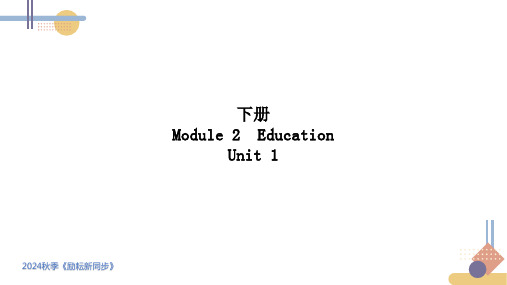
( C )12. A. secret
B. empty
C. special
D. boring
( A )13. A. happiness
B. loneliness C. shyness
D. kindness
( B )14. A. suddenly
B. gradually C. firstly
D. quickly
pupils in most schools in the UK. And each class has about thirty students. All of us think our class is a bit 2 larger than John’s.
2024秋季《励耘新同步》
In the UK, every student 3 wears school uniform. Besides, they usually sit around tables in the classroom. That is to say, they don’t sit in rows. There is a beautiful swimming pool in the school. Kids there usually like swimming 4 in their free time. They also like playing football.
3. There are two big swimming pools in our school.
4. Students in Zhejiang usually sit in rows in the classቤተ መጻሕፍቲ ባይዱooms.
5. Today our task is to remember forty words. But you only need to remember a
外研版九年级英语下学期Module 2 Education知识点总结语法点的精讲精练
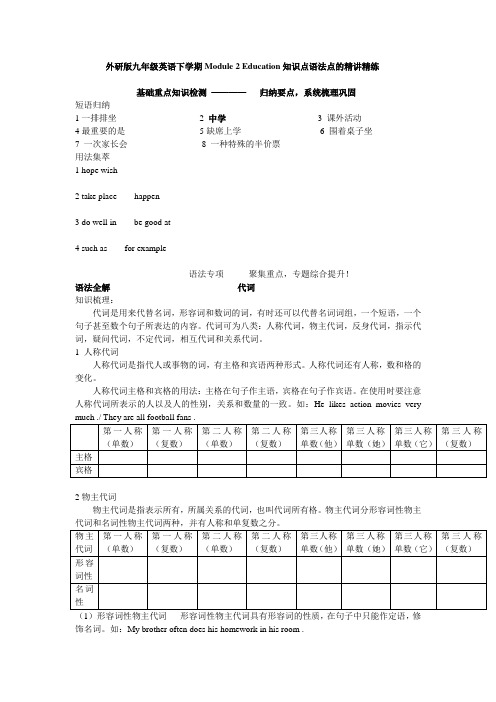
外研版九年级英语下学期Module 2 Education知识点语法点的精讲精练基础重点知识检测————归纳要点,系统梳理巩固短语归纳1一排排坐______________ 2 中学______________ 3 课外活动_________4最重要的是___________ 5缺席上学_____________ 6 围着桌子坐__________ 7 一次家长会___________ 8 一种特殊的半价票________________用法集萃1 hope wish2 take place happen3 do well in be good at4 such as for example语法专项------- 聚集重点,专题综合提升!语法全解代词知识梳理:代词是用来代替名词,形容词和数词的词,有时还可以代替名词词组,一个短语,一个句子甚至数个句子所表达的内容。
代词可为八类:人称代词,物主代词,反身代词,指示代词,疑问代词,不定代词,相互代词和关系代词。
1 人称代词人称代词是指代人或事物的词,有主格和宾语两种形式。
人称代词还有人称,数和格的变化。
人称代词主格和宾格的用法:主格在句子作主语,宾格在句子作宾语。
在使用时要注意人称代词所表示的人以及人的性别,关系和数量的一致。
如:He likes action movies very2物主代词物主代词是指表示所有,所属关系的代词,也叫代词所有格。
物主代词分形容词性物主代词和名词性物主代词两种,并有人称和单复数之分。
饰名词。
如:My brother often does his homework in his room .(2)名词性物主代词名词性物主代词具有名词的性质,在句子中作主语,表语,宾语和定语。
它的意义相当于“形容词性物主代词+名词”,如:Mine=my +名词A 作主语,如: Our school is here ,and theirs is over there .B 作表语,如: These bikes are not ours ,but theirs .C 作宾语,如:He is using my knife .May i use yours ?D 与of 构成短语作后置定语,如: Jack is a friend of mine .3指示代词表示空间和时间远近关系的代词称为指示代词。
2023九年级英语下册Module2Education重点知识梳理(新版)
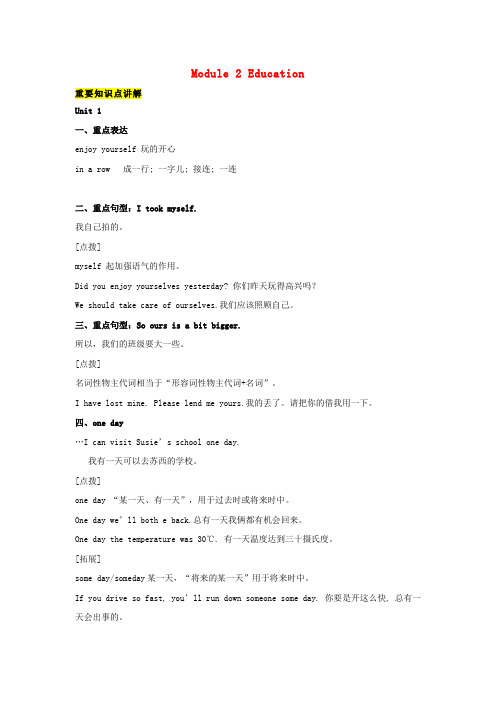
Module 2 Education重要知识点讲解Unit 1一、重点表达enjoy yourself 玩的开心in a row 成一行; 一字儿; 接连; 一连二、重点句型:I took myself.我自己拍的。
[点拨]myself 起加强语气的作用。
Did you enjoy yourselves yesterday? 你们昨天玩得高兴吗?We should take care of ourselves.我们应该照顾自己。
三、重点句型:So ours is a bit bigger.所以,我们的班级要大一些。
[点拨]名词性物主代词相当于“形容词性物主代词+名词”。
I have lost mine. Please lend me yours.我的丢了。
请把你的借我用一下。
四、one day…I can visit Susie’s school one day.我有一天可以去苏西的学校。
[点拨]one day “某一天、有一天”,用于过去时或将来时中。
One day we’ll both e back.总有一天我俩都有机会回来。
One day the temperature was 30℃. 有一天温度达到三十摄氏度。
[拓展]some day/someday某一天,“将来的某一天”用于将来时中。
If you drive so fast, you’ll run down someone some day. 你要是开这么快, 总有一天会出事的。
Unit 2一、重点表达twenty minutes away from my home 离我家二十分钟的路程instead of 代替;而不是above all 首要的是,尤其; 最重要的是be absent from 缺席a parents’ meeting家长会We go to school every weekday from 8:45 am to 3:15 pm.我们每天从上午8:45到下午3:15上学。
Module2EducationUnit2WhatdoIlikebestaboutschool教案

3.成果分享:每个小组将选择一名代表来分享他们的讨论成果。
(五)总结回顾(用时5分钟)
今天的学习,我们了解了学校生活的多个方面,学会了如何表达自己对学校的喜爱。同时,通过实践活动和小组讨论,我们加深了对这些知识点的理解。我希望大家能够将这些知识点应用到日常生活中,并在需要时能够自信地表达自己的观点。如果有任何疑问,请随时向我提问。
-语法:掌握情态动词“can”的用法,以及形容词和副词的搭配,用于描述学校的特点和个人能力。
-表达:学会表达自己对学校的喜爱之处,并能够撰写相关主题的短文。
-文化:理解并比较中西方教育文化的差异。
举例:在讨论学校特点时,学生应能使用“School offers a variety of activities, which can develop our intelligence and creativity.”这样的句子。
2.教学难点
-词汇运用:学生可能难以在实际对话或写作中灵活运用新词汇,特别是词汇的搭配和语境适应性。
-语法理解:对于情态动词“can”的用法,学生可能会混淆其与其他情态动词的区别,以及如何在不同情境下使用。
-表达能力:学生可能在表达个人观点时缺乏条理性和连贯性,难以构建逻辑清晰的表达。
-文化差异:理解中西方教育文化差异可能对学生来说是一个挑战,他们可能缺乏相关背景知识和深入的思考。
3.重点难点解析:在讲授过程中,我会特别强调使用情态动词“can”表达能力和使用形容词、副词描述学校特点这两个重点。对于难点部分,我会通过例句和实际情境来帮助大家理解。
(三)实践活动(用时10分钟)
Module2Education教案
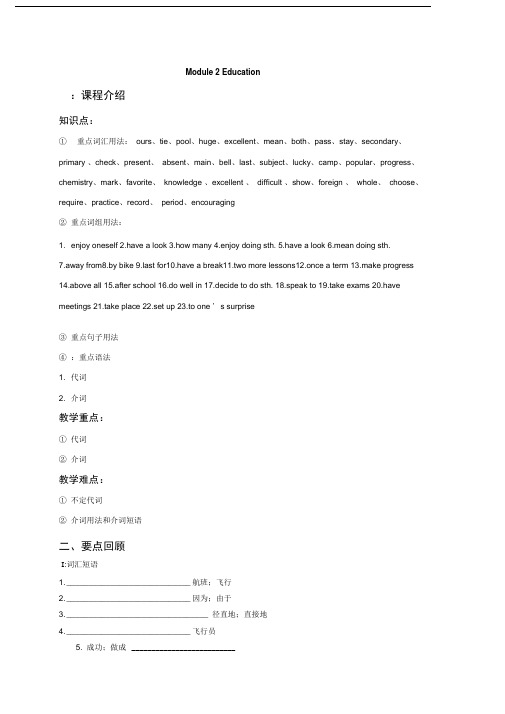
Module 2 Education:课程介绍知识点:①重点词汇用法:ours、tie、pool、huge、excellent、mean、both、pass、stay、secondary、primary 、check、present、absent、main、bell、last、subject、lucky、camp、popular、progress、chemistry、mark、favorite、knowledge 、excellent 、difficult 、show、foreign 、whole、choose、require、practice、record、period、encouraging②重点词组用法:1. enjoy oneself2.have a look3.how many4.enjoy doing sth.5.have a look6.mean doing sth.7.away from8.by bike st for10.have a break11.two more lessons12.once a term 13.make progress 14.above all 15.after school 16.do well in 17.decide to do sth. 18.speak to 19.take exams 20.have meetings 21.take place 22.set up 23.to one ' s surprise③重点句子用法④:重点语法1. 代词2. 介词教学重点:① 代词② 介词教学难点:① 不定代词② 介词用法和介词短语二、要点回顾I:词汇短语1. ____________________________ 航班;飞行2. ____________________________ 因为;由于3. ________________________________ 径直地;直接地4. ____________________________ 飞行员5. 成功;做成__________________________6. 只要____________________________7. [英]毕业生_______________8. 确切地;完全;[口](表示赞同)确实如此___________________9. (告别用语)多保重__________________________10. sir _____________________".officer _______________________12. stupid _______________13. take off ____________________14. jacket __________________答案:1.flight 2.because of 3.direct 4.pilot 5.succeed 6.as long as 7.school-leaver 8.exactly 9.take care10 .先生;长官11.军官;官员;警察12.笨的;糊涂的13.脱去14.短上衣;夹克n.活用句型1. 上周因为天气不好,他们没有举行运动会。
Module 2 Education 知识点总结
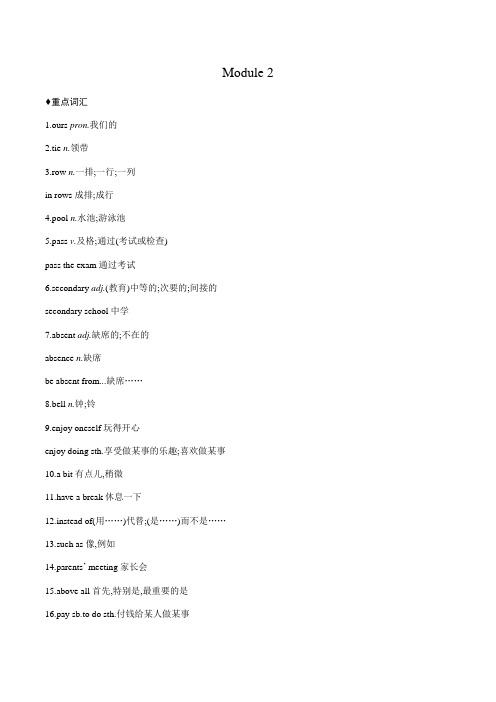
Module 2♦重点词汇1.ours pron.我们的2.tie n.领带3.row n.一排;一行;一列in rows成排;成行4.pool n.水池;游泳池5.pass v.及格;通过(考试或检查)pass the exam通过考试6.secondary adj.(教育)中等的;次要的;间接的secondary school中学7.absent adj.缺席的;不在的absence n.缺席be absent from...缺席……8.bell n.钟;铃9.enjoy oneself玩得开心enjoy doing sth.享受做某事的乐趣;喜欢做某事10.a bit有点儿,稍微11.have a break休息一下12.instead of(用……)代替;(是……)而不是……13.such as像,例如14.parents’ meeting家长会15.above all首先,特别是,最重要的是16.pay sb.to do sth.付钱给某人做某事17.half⁃price ticket半价票18.go on holiday去度假19.at least至少20.take place 发生21.have a record in在某方面有记录22.win prizes for...在……方面获奖23.when it comes to当提到……24.set up建立;设立♦重点句型1.Did you enjoy yourself in London?你在伦敦玩得开心吗?2.Look,everyone is wearing a jacket and tie!看,每个人都穿着夹克,系着领带!3.They don’t sit in rows.他们不是成排坐。
4.I’ve been at River School,London,since I was eleven.我从11岁起就一直在伦敦的里弗学校上学。
九年级英语Module 2 Education外研社知识精讲
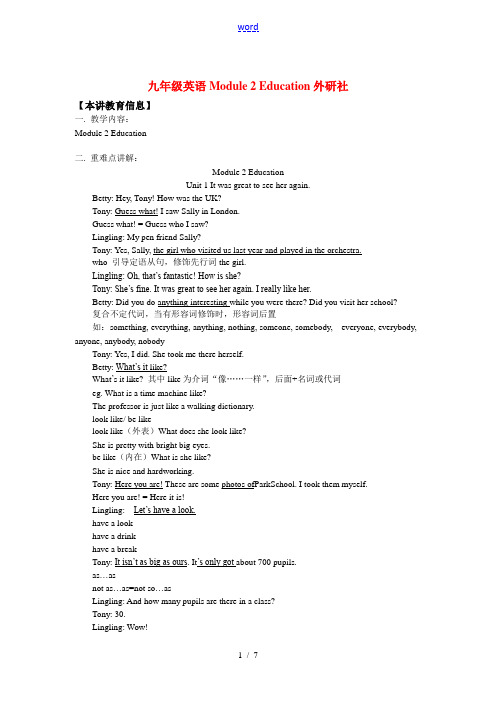
九年级英语Module 2 Education外研社【本讲教育信息】一. 教学内容:Module 2 Education二. 重难点讲解:Module 2 EducationUnit 1 It was great to see her again.Betty: Hey, Tony! How was the UK?Tony: Guess what! I saw Sally in London.Guess what! = Guess who I saw?Lingling: My pen friend Sally?Tony: Yes, Sally, the girl who visited us last year and played in the orchestra.who 引导定语从句,修饰先行词the girl.Lingling: Oh, that’s fantastic! How is she?Tony: She’s fine. It was great to see her again. I really like her.Betty: Did you do anything interesting while you were there? Did you visit her school?复合不定代词,当有形容词修饰时,形容词后置如:something, everything, anything, nothing, someone, somebody, everyone, everybody, anyone, anybody, nobodyTony: Yes, I did. She took me there herself.Betty: What’s it like?What’s it like? 其中like为介词“像……一样”,后面+名词或代词eg. What is a time machine like?The professor is just like a walking dictionary.look like/ be likelook like(外表)What does she look like?She is pretty with bright big eyes.be like(内在)What is she like?She is nice and hardworking.Tony: Here you are! These are some photos ofParkSchool. I took them myself.Here you are! = Here it is!Lingling: Let’s have a look.have a lookhave a drinkhave a breakTony: It isn’t as big as ours. It’s only got about 700 pupils.as…asnot as…as=not so…asLingling: And how many pupils are there in a class?Tony: 30.Lingling: Wow!Tony: Most classes have got a puter and internet. And there are a few science laboratories, and a large library. And there’s a swimming pool and a h uge sports ground.Lingling: But Sally likes music.Tony: Well, there’s a music room, too. And they have a hall for concerts.Lingling: Which school is better, our school or ParkSchool?选择疑问句Tony: Both schools are very nice. And neither school has anythin g the other hasn’t got. But …Betty: But what …?Tony: … but I prefer our school!Daming: I bet we’re even better than park School at English!Lingling: Well, anyway, we’re all going to get top grades for English!much, even, far, still, a lot, a little 修饰比较级anyway=anyhowUnit 2 What’s the best thing about school?My school lifeMy name is Sally Maxwell, and I’m 15. I’ve been at ParkSchool, Landon since I was 11. If I pass my exams next year, I’ll stay here until I’m 18.现在完成时:since/ foruntil/ tillParkSchool is a secondary school, about 20 minutes by bike away from home. Before I came here, I went to primary school, near my home. I started primary school when I was five and stayed there for six years.The school day is from 8:45 am to 3:15 pm. We spend the first 10 minutes in our classroom while our teacher checks which pupils are present or absent. Then everyone goes to the main hall. There our head teacher makes a speech and tells us any news about the school. Lessons begin at 9:05 and last for an hour. We have a break at 11:05until 11:20, then another lesson, then lunch for an hour. We have two more lessons before school finishes.two more lessons= another two lessons= two other lessonsThis year I have 11 subjects: maths, biology, chemistry, French, history, geography, music and IT, PHSE, ADT and PE (these stand for Information Technology; Personal Health and Safety Education; Art, Design and Technology and Physical Education). Fortunately, we don’t have exams in every subject. PHSE is about the dangers of drugs and smoking, among other things. In ADT we also do things like learning to cook as well as drawing and design. Some people can do Italian and Spanish instead of French, but no one is learning Chinese …yet! PE involves physical exercise, basketball, training in the gym and swimming –we’re really lucky to have a swimming pool.stand for 代表,象征,意味着like v. 喜欢prep. 像……一样,比如eg. I don’t like anybody like him.Mary, like her mother, likes dancing.as well asinstead of/ insteadI took exams when I was 7, 10 and 14 years old. Next year I take my exams in eight subjects, and then I can do between three and five subjects for the exams in my final years.We have a large sports ground where we play football, tennis and do athletics both during and after school hours. After-school activities, such as sports clubs and language societies are popular, too. During the school year there are usually visits to museums and galleries and to camps for activities such as climbing and cycling in the country. There are parties and discos and a sports day, and the school play is a really important event. Once a term, there is a parents’ meeting, so our parents and teachers can talk about our progress.What’s the best thing about school? English, history, music… and my friends. What’s the worst thing? Homework… and exams!What’s the best thing about school? 学校最好的方面是什么?【模拟试题】一. 单项选择()1. Mrs Jenny gave us _______ on how to learn English well.A. some advicesB. many advicesC. some adviceD. an advice()2. After playing football for more than a half hour, the students took _______rest.A. a few minute’sB. a few minutes’C. a little minute’sD. a little minutes’()3. —Which do you prefer, coffee or cola?—______, thanks. I’d like a cup of tea.A. EitherB. BothC. NeitherD. None()4. The population of China is much larger than ______ of Russia.A. thisB. thatC. itD. those()5. —Who is singing in the next room?—______ must be Mary.A. SheB. ThisC. ItD. He()6. Our summer holiday is ing. Two _______ the students in our school will go to the beach.A. hundredB. hundredsC. hundred ofD. hundreds of()7. Both of the two rulers are broken. I want to buy a ______ one.A. threeB. thirdC. forthD. 不填()8. My teacher told me not to give ______ any subject, or I would fall ______ the others.A. to ; offB. in ; overC. up ; behindD. back ; down()9. Lucy knew nothing about it _______ her sister told her.A. becauseB. untilC. ifD. since()10. —Mum. Bill is ing to dinner this evening.—OK. Let’s give him _______ to eat.A. something differentB. different anythingC. anything differentD. different something()11. —What do you think of the football match?—Wonderful. The Chinese football team has never played _______.A. betterB. bestC. worseD. worst()12. The scientists from _______ United States live in _______ Ninth Street.A. the; theB. / ; theC. / ; /D. the ; /()13. Because of the bad transportation, he _______ living in the country to living in the city.A. likesB. prefersC. enjoysD. loves()14. We will go for a piic if it _______ this Sunday.A. isn’t rainingB. won’t rainC. doesn’t rainD. don’t rain()15. Bill was listening to the radio while Ann _______ TV.A. watchedB. was watchingC. has watchedD. had watched二. 完型填空Many people go to school for education. They learn languages, history, geography, physics, chemistry and math. ______(1)go to school to learn a skill so that they can _______ (2). School education is very important and useful, _______(3)no one can learn everything from school. A teacher, no matter _______ (4)he knows, cannot teach his students everything they want to know. His job is to _______ (5)his students to know how to learn. He teaches them how to read and how to think. So, much more is to be learnt _______(6)school by the students themselves.It’s _______(7)more important to learn how to study by oneself than to memorize some facts or rules. It is quite ________(8)to learn a fact in history or a formula(公式)in math, but it is very difficult to use a formula in _____(9)a math problem. Great scientists, _______(10)Newton, Galileo and Edison, didn’t get ________ (11)from school, but they were all successful. They invented ________(12)many things. The reason for their success ________ (13)that they knew _______(14)to study. They read books that were not taught at school. They worked hard ______(15)their lives, wasting not a single moment. Above all, they knew how to use their brains.()1. A. Another B. Others C. The other D. The others()2. A. get education B. read more booksC. pass the examsD. make money()3. A. but B. then C. and D. however()4. A. how B. how much C. when D. how many()5. A. ask B. make C. help D. tell()6. A. outside B. in C. at D. from()7. A. nearly B. almost C. always D. often()8. A. easy B. difficult C. important D. necessary()9. A. writing B. finding C. answering D. solving()10. A. with B. like C. but D. except()11. A. anything B. something C. nothing D. everything()12. A. very B. so C. much D. such()13. A. is B. are C. was D. were()14. A. where B. which C. how D. why()15. A. all B. of C. during D. with三. 阅读理解(A)In Singapore, many middle school students spend a lot of their time on their studies. Good education is often regarded as a ticket to success in their future. So many of these students try their best to get a good mark in their examinations. They have a lot of homework every day and exams are a big headache. Sometimes some of them are even made to go to remedial(补习的)classes after school.Schools run programmes outside school hours. The students can take part in sports and games, music and dance, hiking and rock-climbing, etc. They are also very active in munity service(社区服务).In their spare time, most students like to listen to pop music. Hollywood blockbusters(大片). Hong Kong and Singapore movies are very popular among them. They understand IT very well. Some of them also spend their free time surfing the Internet, ing their friends, playing puter and video games.They sometimes go to cafes, fast-food restaurants, shopping centers and big bookstores.So, it looks like life as a middle school student in Singapore is not easy but it is rich and colorful.()1. What is NOT mentioned in the passage?A. Schoolwork.B. After-class activities.C. SubjectsD. Things to do in the spare time.()2. Why do students work hard at school in Singapore?A. Because they have a lot of homework.B. Because they have to go to remedial classes.C. Because they want to get a good future.D. Because they have many outside school activities.()3. What does the underlined sentences mean in the first paragraph?A. Students are afraid of exams.B. Students have a headache before an exam.C. Students have too many exams.D. Students are in poor health because of exams.()4. Programmes outside school hours are _______.A. the same as spare time activitiesB. remedial classes after schoolC. sports activesD. popular among students()5. What do you know from the last sentences?A. The middle school students live an easy life in Singapore.B. The middle school students’ life in Singapore is amazing.C. The middle school students’ life in Singapore is boring.D. The middle school students’ life in Singapo re is hard, but interesting.(B)ENJOY YOUR FAVOURITES IN STAR CINEMATickets must be booked any time up to 30 minutes before the film stars.Ticket holders are given seat numbers.Drinks are provided.Food may be bought from the shop and eaten int the area provided outside the cinema.Ticket price: Adults: $ 16; Children under 6: $ 6; Students under 16: $ 10Smoking is not allowed anywhere in the cinema.Mobile phones must be powered off.根据短文内容回答问题。
Module 2 模块知识梳理九年级英语下册外研版
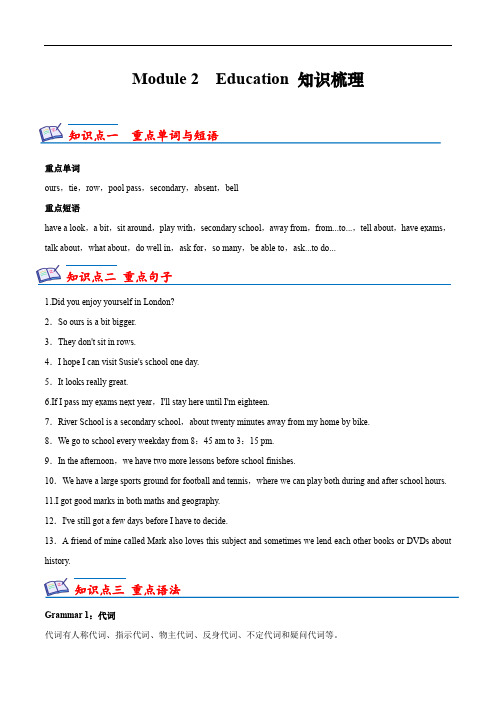
Module 2 Education知识梳理知识点一重点单词与短语重点单词ours,tie,row,pool pass,secondary,absent,bell重点短语have a look,a bit,sit around,play with,secondary school,away from,from...to...,tell about,have exams,talk about,what about,do well in,ask for,so many,be able to,ask...to do...知识点二重点句子1.Did you enjoy yourself in London?2.So ours is a bit bigger.3.They don't sit in rows.4.I hope I can visit Susie's school one day.5.It looks really great.6.If I pass my exams next year,I'll stay here until I'm eighteen.7.River School is a secondary school,about twenty minutes away from my home by bike.8.We go to school every weekday from 8:45 am to 3:15 pm.9.In the afternoon,we have two more lessons before school finishes.10.We have a large sports ground for football and tennis,where we can play both during and after school hours.11.I got good marks in both maths and geography.12.I've still got a few days before I have to decide.13.A friend of mine called Mark also loves this subject and sometimes we lend each other books or DVDs about history.知识点三重点语法Grammar 1:代词代词有人称代词、指示代词、物主代词、反身代词、不定代词和疑问代词等。
新外研版九下Module2 Education知识点总结
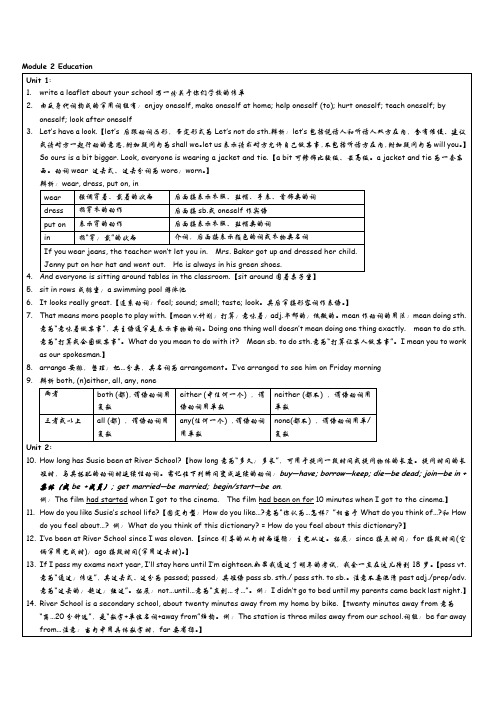
三者或以上
all (都),谓语动词用复数
any(任何一个),谓语动词用单数
none(都不),谓语动词用单/复数
Unit 2:
10.How long has Susie been at River School?【how long意为“多久;多长”,可用于提问一段时间或提问物体的长度。提问时间的长短时,与其搭配的动词时延续性动词。需记住下列瞬间变成延续的动词:buy—have; borrow—keep; die—be dead; join—be in +集体(或be +成员); get married—be married; begin/start—be on.
Jenny put on her hat and went out. He is always in his green shoes.
4.And everyone is sitting around tables in the classroom.【sit around围着桌子坐】
5.sit in rows成排坐;a swimming pool游泳池
Module 2 Education
Unit 1:
1.write a leaflet about your school写一份关于你们学校的传单
2.由反身代词构成的常用词组有:enjoy oneself, make oneself at home; help oneself (to); hurt oneself; teach oneself; by oneself; look after oneself
14.River School is a secondary school, about twenty minutes away from my home by bike.【twenty minutes away from意为“离…20分钟远”,是“数字+单位名词+away from”结构。例:The station is three miles away from our school.词组:be far away from…注意:当句中用具体数字时,far要省掉。】
九年级下Module 2 Education重点知识清单(教师版)
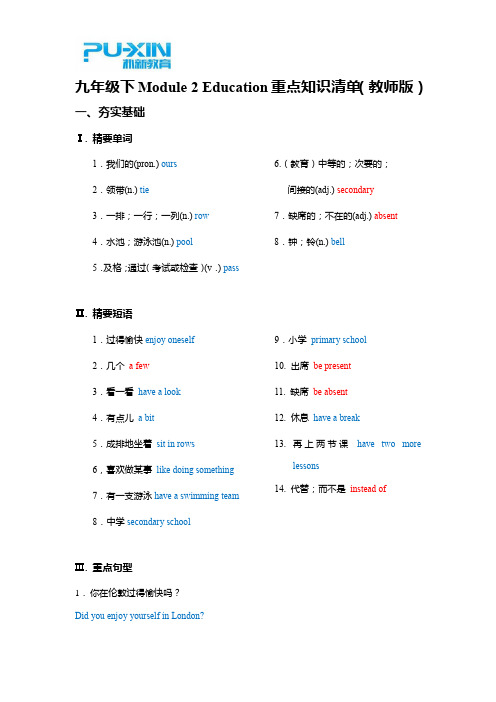
九年级下Module 2 Education重点知识清单(教师版)一、夯实基础Ⅰ. 精要单词1.我们的(pron.) ours2.领带(n.) tie3.一排;一行;一列(n.) row4.水池;游泳池(n.) pool5.及格;通过(考试或检查)(v.) pass 6.(教育)中等的;次要的;间接的(adj.) secondary 7.缺席的;不在的(adj.) absent 8.钟;铃(n.) bellⅡ. 精要短语1.过得愉快enjoy oneself2.几个a few3.看一看have a look4.有点儿a bit5.成排地坐着sit in rows6,喜欢做某事like doing something 7.有一支游泳have a swimming team 8.中学secondary school 9.小学primary school10. 出席be present11. 缺席be absent12. 休息have a break13. 再上两节课have two morelessons14. 代替;而不是instead ofⅢ. 重点句型1.你在伦敦过得愉快吗?Did you enjoy yourself in London?2.这儿有几张照片。
Here are a few photos.3.瞧,每个人都穿着夹克衫,打着领带。
Look, everyone is wearing a jacket and tie.4.上课前,我们的老师检查学生的出勤情况。
Before class, our teacher checks which pupils are present or absent.5.下午放学前我们还上两节课。
In the afternoon, we have two more lessons before school finishes.6.一些人学德语而不学法语。
Some people learn German instead of French.7.我们有一个大的足球和网球运动场地,在那里我们上学和放学期间都可以玩。
Module2EducationUnit1Theydon'tsitinrows.教案
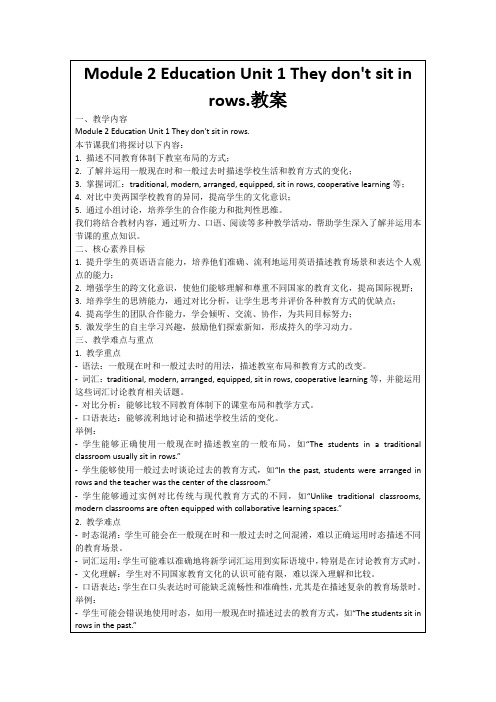
3.成果展示:每个小组将向全班展示他们的讨论成果和体验报告。
(四)学生小组讨论(用时10分钟)
1.讨论主题:学生将围绕“教育方式在实际生活中的应用”这一主题展开讨论。他们将被鼓励提出自己的观点和想法,并与其他小组成员进行交流。
五、教学反思
在今天的教学中,我发现学生们对教育体制和教室布局的话题非常感兴趣。他们积极参与讨论,提出了很多有见地的观点。通过对比传统和现代教育方式,学生们不仅学会了如何用英语描述不同的教育场景,还对教育理念有了更深入的理解。
在讲授过程中,我发现有些学生在时态运用和词汇表达方面还存在一定的困难。针对这一点,我采用了较多的实例和对比分析,帮助学生理解和记忆。在今后的教学中,我还需要继续关注这部分学生的进步,适时给予个别辅导,提高他们的英语表达能力。
在今后的教学中,我还需要加强对教育理念和文化差异的讲解,让学生们更好地理解不同国家的教育背景,提高他们的跨文化意识。同时,我将不断调整教学策略,关注学生的个体差异,努力提高他们的英语学科核心素养。
此外,实践活动和小组讨论环节,学生们表现出强烈的合作意愿和探究精神。他们在讨论中互相启发,共同解决问题,取得了很好的学习效果。这也让我意识到,在教学中,要充分发挥学生的主体作用,鼓励他们积极参与,提高课堂互动性。
然而,我也注意到,在小组讨论中,部分学生较为内向,发言不够积极。为了激发这部分学生的积极性,我计划在今后的教学中,多设计一些开放性的问题,给予他们更多的鼓励和支持,让他们在课堂上勇于表达自己的观点。
5.激发学生的自主学习兴趣,鼓励他们探索新知,形成持久的学习动力。
三、教学难点与重点
1.教学重点
外研版英语九下Module2《Education》模块说课稿
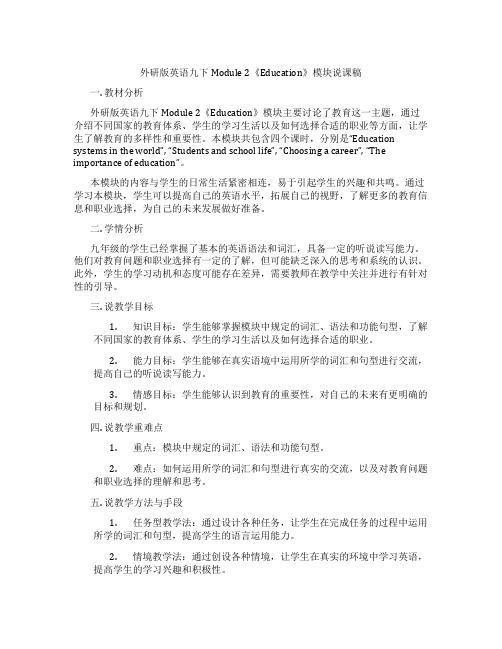
外研版英语九下Module 2《Education》模块说课稿一. 教材分析外研版英语九下Module 2《Education》模块主要讨论了教育这一主题,通过介绍不同国家的教育体系、学生的学习生活以及如何选择合适的职业等方面,让学生了解教育的多样性和重要性。
本模块共包含四个课时,分别是“Education systems in the world”, “Students and school life”, “Choosing a career”, “The importance of education”。
本模块的内容与学生的日常生活紧密相连,易于引起学生的兴趣和共鸣。
通过学习本模块,学生可以提高自己的英语水平,拓展自己的视野,了解更多的教育信息和职业选择,为自己的未来发展做好准备。
二. 学情分析九年级的学生已经掌握了基本的英语语法和词汇,具备一定的听说读写能力。
他们对教育问题和职业选择有一定的了解,但可能缺乏深入的思考和系统的认识。
此外,学生的学习动机和态度可能存在差异,需要教师在教学中关注并进行有针对性的引导。
三. 说教学目标1.知识目标:学生能够掌握模块中规定的词汇、语法和功能句型,了解不同国家的教育体系、学生的学习生活以及如何选择合适的职业。
2.能力目标:学生能够在真实语境中运用所学的词汇和句型进行交流,提高自己的听说读写能力。
3.情感目标:学生能够认识到教育的重要性,对自己的未来有更明确的目标和规划。
四. 说教学重难点1.重点:模块中规定的词汇、语法和功能句型。
2.难点:如何运用所学的词汇和句型进行真实的交流,以及对教育问题和职业选择的理解和思考。
五. 说教学方法与手段1.任务型教学法:通过设计各种任务,让学生在完成任务的过程中运用所学的词汇和句型,提高学生的语言运用能力。
2.情境教学法:通过创设各种情境,让学生在真实的环境中学习英语,提高学生的学习兴趣和积极性。
3.合作学习法:通过小组合作完成任务,培养学生的团队协作能力和沟通能力。
Module 2 Education-2020-2021学年最新外研版九年级下册英语各模块知识点精讲
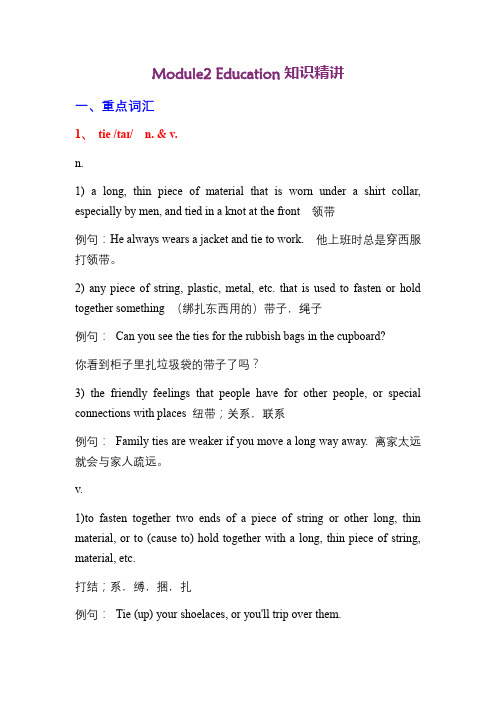
Module2 Education知识精讲一、重点词汇1、tie /taɪ/ n. & v.n.1) a long, thin piece of material that is worn under a shirt collar, especially by men, and tied in a knot at the front 领带例句:He always wears a jacket and tie to work. 他上班时总是穿西服打领带。
2) any piece of string, plastic, metal, etc. that is used to fasten or hold together something (绑扎东西用的)带子,绳子例句:Can you see the ties for the rubbish bags in the cupboard?你看到柜子里扎垃圾袋的带子了吗?3) the friendly feelings that people have for other people, or special connections with places 纽带;关系,联系例句:Family ties are weaker if you move a long way away. 离家太远就会与家人疏远。
v.1)to fasten together two ends of a piece of string or other long, thin material, or to (cause to) hold together with a long, thin piece of string, material, etc.打结;系,缚,捆,扎例句:Tie (up) your shoelaces, or you'll trip over them.把鞋带系好,不然会摔跤的。
- 1、下载文档前请自行甄别文档内容的完整性,平台不提供额外的编辑、内容补充、找答案等附加服务。
- 2、"仅部分预览"的文档,不可在线预览部分如存在完整性等问题,可反馈申请退款(可完整预览的文档不适用该条件!)。
- 3、如文档侵犯您的权益,请联系客服反馈,我们会尽快为您处理(人工客服工作时间:9:00-18:30)。
Module 2 Education词句精讲精练词汇精讲1. enjoy doing“ enjoy doing sth.意为’喜欢做.. "或者做.... 很开心/很享受”。
其中的“ enjoy是动词,有“欣赏,享受,喜爱”等意思,后接名词、代词或动名词。
例如:People enjoy the city ' s quie人民喜爱这个城市宁静的街道。
I enjoy listening to pop music. 我喜欢听流行音乐。
【拓展】enjoy常见的习惯用语还有enjoy on eself玩得开心,过得愉快”和“ have a goodtime ”同义。
例如:They are enjoying themselves. = They are having a good time.他们玩的很开心。
2. wearwear意为穿,戴”其后接衣服、鞋帽、眼镜等名词。
例如:She likes wearing a skirt. 她喜欢穿裙子。
【拓展】辨析:put on,wear 与input on, wear 与in 都有“穿,戴”之意。
(1)wear指穿的状态,意为穿着,戴着”例如:She is wearing a red skirt. 她穿着红裙子。
(2)put on 指穿的动作,意为“穿上,戴上”。
例如:He is putting on his shoes. 他在穿鞋。
(3)in 指穿的状态,意为“穿着,戴着”。
但它不能作谓语,后常跟表示颜色的词。
例如:She is in red today. 她今天穿的红衣服。
3. hopehope 作动词,意为“想,希望”,主要用法如下:( 1 )hope 后面可直接跟动词不定式,即hope to do sth. 表示“希望做某事”。
例如:I hope to see Niagara Falls some day. 我希望有一天能看看尼加拉瓜瀑布。
(2)表达“希望某人做某事”时,不能用hope sb. to do sth. ,只能在hope 后接宾语从句,即“hope + (that)从句”,表示可能实现的愿望。
例如:I hope (that) you will have a good time. 我希望你玩的愉快。
(3)hope后不能直接接名词作宾语,若要接名词,需先接for,即hope for sth.,表示可实现的希望。
例如:After these dry days, everyone hopes for rain.干燥的天气之后,人人都希望下雨。
【拓展】wish 的用法:wish 作动词,也表示“想,希望”,但用法是有区别的。
( 1 )wish sb. sth. 表示“祝愿”。
例如:Wish you success! 祝你成功。
(2)wish sb. to do sth. 表示“希望(某人)做某事”。
例如:I wish you to win the game. 我希望你能赢得这场比赛。
(3)“wish + (that)从句”,表示不可能实现或实现的可能性较小的愿望。
例如:I wish I could fly like a bird. 我希望我能像鸟儿一样飞。
4. take placetake place 表示“发生、举行、举办”,一般指非偶然性事件的“发生”,即这种事件的发生一定有某种原因或事先的安排。
例如:When will the wedding take place? 婚礼什么时候举行?Great changes have taken place in our hometown during the past ten years. 在过去的十年,我们的家乡发生了巨大的变化。
【拓展】happen 和take place 的辨析:(1)happen指具体客观事物的发生,常有偶然性,未能预见性,即偶然发生”。
例如:What happened to him? 他出了什么事?(2)take place 常用于历史事件或会议的发生,以及化学、物理变化,有事先预料或计划的意思,即“计划发生”。
例如:The party took place yesterday evening. 昨晚举办了晚会。
【注意】happen 和take place 均为不及物动词,无被动语态。
5. pass(1)pass用作不及物动词,有经过,穿过"的意思,常与by; through等连用。
例如:They passed through the forest. 他们穿过了森林。
(2)pass作通过(考试),及格"讲时,多用作及物动词。
例如:He passed the exam. 他考试及格了。
(3)pass sb. sth. = pass sth. to sb. 意为“将某物传递给某人”。
例如:He passed me a pen. = He passed a pen to me. 他递给我一支笔。
(4)pass on是动副结构,意为继续传递”,pass on sth. to sb. = pass sth. on to sb,但当sth是代词时,只能放在pass on之间。
例如:When he got the message, he passed it on to others. 当他获得这个消息时,他继续传递给别人。
6. present(1)present 作形容词,意为“出席的,在场的”;还意为“现在的,当前的”。
例如:How many people were present at the meeting?到会的有多少人?I ' m not at all satisfied with the present situation. 我对目前的情况一点都不满意。
(2)present作名词,意为礼物,赠品”。
the present意为现在,目前”。
例如:He often gave his neighbor ' s kids little presents.他常常送些小礼物给邻居的孩子。
There is no time like the present.机不可失,时不再来。
(3)present作及物动词,意为赠送,呈献"后接to/with。
例如:They presented him with a bunch of flowers.他们献给他一束鲜花。
7. enough(1)enough 是形容词,意为“充足的,充分的,足够的”,可作表语或定语,作定语时,可放在名词的前面或后面。
例如:The food is enough for the trip. 用于这次旅行的食物足够了。
I have enough time to watch TV . 我有足够的时间看电视。
(2)enough 还可作副词,意为“足够地”,这时enough 需放在所修饰的形容词或副词后面。
例如:The young man is strong enough to carry the heavy bag. 那个年轻人足够强壮能搬动重包。
【拓展】(1)enough…to do sth.有足够的..... 做某事”例如:I don ' t have enough time to eat lunc我没有足够的时间吃午饭。
(2)…enough to do ••可以同too…to ••或so…that ••结构互相转换。
例如:He isn ' t old enough to go to school. = He is too young to go to school.=He is so young t hat he can ' t go to sch^b太小而不能上学。
8. few(1)few 意为“少数的;很少的”,只修饰可数名词,表否定含义。
例如:I can see few birds in the tree. 我几乎看不到树上有鸟。
(2)a few意为几个;少许”相当于several,只修饰可数名词复数,表肯定含义。
例如:He has a few friends. 他有几个朋友。
【拓展】( 1 )little 意为“很少;一点儿”,用于“量;额;价值”等概念,修饰不可数名词,表否定含义。
little 还表示“小的”之意。
例如:There is little milk in the cup. 杯子里没有牛奶了。
A little boy is coming. 一个小男孩过来了。
(2)a little 意为“有点儿;少量”修饰不可数名词,表示肯定含义。
例如:He has a little money with him. 他随身带了点儿钱。
(3)a little 也可以用作副词,修饰形容词、副词、动词以及介词短语,表示“有点,稍稍”。
例如:He is a little tired. 他有点累了。
You should walk a little faster. 你应该走快一点。
She was only a little over fifty years old. 她才五十多一点。
词汇精练I .根据首字母或汉语提示完成句子。
1 .Their school is very big ,but o _____ is bigger .2.My mother is always w _____ about my study .3.I bought a pretty ______ (领带) for my father as a birthday gift .4.How long will the meeting _______ (持续)?5.He jumped into a swimming ______ (水池).6.I believe I can p ______ the English test .7.—Who is a ______ today?—Daming.He is ill in hospital .8.Ring the ______ (铃) to see if they ' re.in9. ______ (日本的)cherry(樱花)blossoms are good to see.10.Our teachers can talk about our _____ ( 进步) with our parents when there is a parents ' mee.tingn .用括号内词的适当形式填空。
1.I took a few _____ (photo) of our school last week .2.Did they enjoy ____ (they) at the party last night?3.I forgot my pen at home. Can I use ___ (you)?4.Do you enjoy _____ (listen) to English songs?5.Which do you think is _____ (interesting) ,going to a picnic or going fishing? 6.I don 't know whether the dream can coemtrue,but I will try ______ (I) best .7.The 2019 Olympic Winter Games is the _____ (one) time for Russia to host such games.8.Mona also bought an alarm clock yesterday .I compared my alarm clock with______ (her) .9.Kids ,help ___ (you) to some fruit .It's good for your health.10.Students in some junior schools can ____ (learn) to play tennis or baseball in PE lessons.川.用适当的介词填空。
